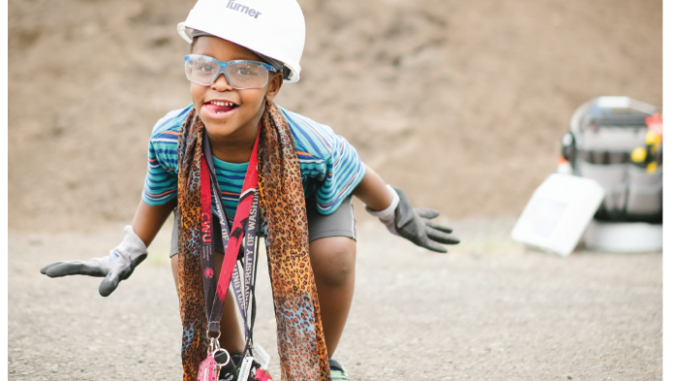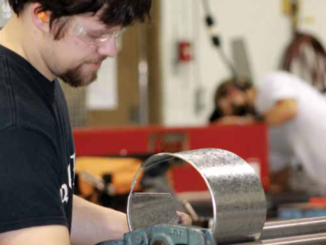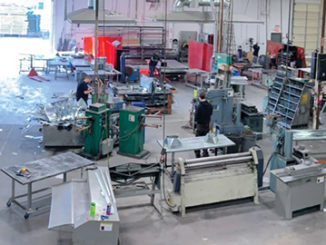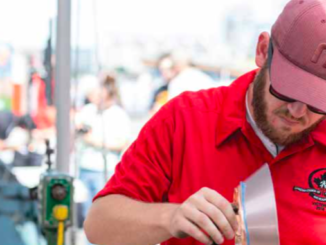
Construction for Change and 30/30 Build Essential Services Facilities in Communities at Home in the United States and Abroad
By Jessica Kirby with files from Construction for Change
Photos courtesy of World Relief Seattle
Construction for Change operates on a simple vision: every person – regardless of where they live – should have access to well-built spaces where they can manage their health, further their education, or increase their economic mobility.
The non-profit organization, which includes support from several members of the sheet metal industry, partners with other non-profits to design, plan, and build spaces where people can become healthier, better their education, and increase economic mobility. The work generally comprises architectural and engineering, construction management, and construction services, completed pro bono and through in-kind donations. CfC’s work is collaborative, leveraging the efforts of volunteers and world-class design and architectural firms and forgoing short-term gains that could hinder greater success in the long term.
“Construction for Change does amazing work internationally and here at home in the United States,” says Julie Muller-Neff, executive vice-president of SMACNA-Western Washington. “It is truly a collaboration of talent, knowledge, and willingness to help others that brings this group together.”
The group’s motivation is social impact over financial profit and it only pursues work that aligns with its mission-driven priorities. Always keeping budget, cultural sensitivity, and longevity in mind, CfC expects results. The group monitors its projects – domestic and abroad – and measures and the benefits they bring to communities in order to learn and improve.
“SMACNA supports CfC because we believe that it is important for our thriving construction industry to give back locally and globally,” says Muller-Neff. “CfC offers SMACNA and member firms the opportunity to collaborate with other industry partners in an effort to build mutually beneficial relationships and make meaningful contributions to those in need and the people struggling to provide essential services in their communities.”
Bringing this vision to life means CfC works with organizations that provide life-changing resources, such as schools and medical facilities, who have outgrown their current facilities or want to expand the services they offer. CfC and the partnering organization consider needs, current facilities, opportunities for growth or expansion, and ways to implement cultural sensitivity and durability into each project.
Some of CfC’s key projects include health facilities in Nsambe, Malawi; Mbita, Kenya; and Jharkhand, India; educational spaces in Campon Cham, Cambodia and Kakata, Liberia; and, a food bank and community gardens in Seattle, WA.
“One other cool aspect of CFC is the Change Fellowship program,” says Mahi Demissie, CfC’s board chair and project manager at Sellen Construction Company. “The program provides an opportunity for young, underrepresented construction leaders to gain practical training, mentorship, and international project management experience. The goal is to give them an edge in the job market and grow the number of women and minorities working in the management ranks of construction and related fields.”
30/30 Project
Much of Construction for Change’s recent work has been accomplished through its multi-build partnership with the 30/30 Project.
The 30/30 Project believes healthcare is a human right and envisions a world in which everyone can get the healthcare they need,” says Kevin Hunter, executive director of Construction for Change.
Julie Lewis, a 30-year HIV survivor and mother to Grammy winning, songwriter and performer Ryan Lewis, founded the 30/30 Project to improve global healthcare access.
“Their goal is to construct 30 healthcare facilities worldwide that are built to rigorous standards and will stand for at least another 30 years,” says Hunter. “To make this goal a reality, the 30/30 Project partnered with Construction for Change to coordinate design, development, and construction management of medical facilities with in-country organizations.”
Together, CfC and 30/30 have constructed or are in the process of building 16 healthcare facilities, three maternity wards, two inpatient wards, one refugee garden, two outreach centers, and one lab across nine different countries.
“These facilities have logged 215,963 patient visits, administered 73,983 HIV tests, and performed 10,247 prenatal visits,” says Hunter. “Now in the final year of the five-year initiative, the 30/30 Project will select its final facilities in the next four to five months.”
A recently completed community gardens project in Kent, WA was a CfC and 30/30 initiative, meeting the healthcare mandate by supporting healthy eating and access to fresh, nutritious food, which helps people stay healthy.
Case Study: World Relief Seattle – Community Gardens and Training Kitchen
World Relief Seattle (WR Seattle) envisions every local refugee and vulnerable immigrant welcomed by community, rooted in community, and empowered for community.
The work is informed by the belief that every refugee and vulnerable immigrant has an important place in our community. From the time of arrival to the first job to citizenship and beyond, the World Relief community is committed to serving and being served by this brave and resilient population.
World Relief Seattle has existed since 1979 to empower the local church to serve refugees and immigrants in the Greater Seattle Area.
Originally founded to care for those fleeing war in Southeast Asia, WR Seattle has since grown to resettle refugees from almost 50 countries. The group is encouraged by the many businesses, service agencies, and individuals who use their resources and ingenuity to enhance the lives of refugees throughout Western Washington.
The Need
The majority of people served by WR Seattle come from Second or Third World contexts. Most refugees are fleeing political unrest, unjust societies, or natural disasters. They have experienced significant trauma and now face an uncertain economic future, and feel isolated without being connected to a local community of trusted relationships. A high percentage of this population comes from agrarian societies and have the skills to grow their own food if given access to land.
In short, refugee populations need a places within close proximity of their new residence to grow crops in environments where large numbers of families can gather and work together to build community connections and resiliency while also developing new skills, allowing them to become economically mobile.
The Opportunity
In 2017, WR Seattle and Hillside Nazarene Church in Kent, Washington developed a strategic partnership. The church was looking to redevelop itself in the midst of a changing demographic and community. It had a very large, unused parking lot and a large building that was woefully under-used throughout the week. What emerged was a vision for a large community garden where families would have their own plots, as well as a certified training kitchen where individuals could be trained in food prep and service, ultimately providing them the skills needed to seek employment and economic livelihood. The results would be families coming together to build connective relationships, growing healthy and sustainable food, and gaining critical job skills to enter the local economy.
The Challenge
While the vision began to crystalize, the fact remained that both WR Seattle and the local church did not possess the in-house land redevelopment and construction skill sets nor the budget flexibility to hire these capacities on the open market, especially in a pressurized Seattle construction boom. It became clear they needed a partner that understood the complexities of taking on the redevelopment of a large parcel of land on a significant slope and turning it from pavement to farm land. The community partner would also need to facilitate a significant interior remodel of existing space to create a community teaching kitchen.
This project would require significant analysis, planning, and design related to the demolition, water run off and collection, and navigating the permitting process with the City of Kent. Also, like any building project there would need to be architectural renderings that would need to be developed and used as marketing materials for the capital campaign.
Key Deliverables from CfC
In May 2017, CfC was retained and officially signed a contract to manage the project. CfC retained a volunteer project manager, Shannon B. from Turner Construction, to oversee the project in collaboration with Tim Hickory, CfC’s Director of Operations.
Next, CfC was able to secure a partnership with a local plumbing nonprofit, Plumbers Without Borders, and the Local 32 Plumbers Union, which together provided pro bono engineering and installation services. CfC also brought on a local architectural firm, Collins Woerman, as a pro bono designer to review the site and begin design of the gardens and the hydronics that would be needed to ensure the project was sustainable and able to cover the minimum operating costs moving forward. Design and engineering were completed in May, 2017. This enabled the fundraising campaign to have design renderings to share with potential stakeholders and working drawings from which to proceed with construction.
Through CfC’s pre-construction services, the project was able to submit for the required permits in August, 2017.
CfC project management began scheduling volunteer work parties for demolition of the parking lot, construction of elevated garden plots totaling 50, construction of four large water cisterns for capturing and collecting water run off, and rain gardens filtering waste water from remaining parking areas.
CfC was successful in generating pro bono services from a number of general contractors and mechanical contractors in the region contributing in-kind materials and in-kind professional skilled labor.
It also became clear that the formal engagement of CfC increased the confidence level of potential funders and stakeholders across the project and had a catalytic effect in generating additional partners and support for the project.
“With the partnership of Construction for Change we are able to have a safe, beautiful, green meeting and growing space that engages the community,” says Chitra Hanstad, executive director, World Relief Seattle. “We are looking forward to continuing the partnership that will impact even more members of the refugee and immigrant community.”
On May 5, 2018 the community food garden formally was opened and began operations. ß



